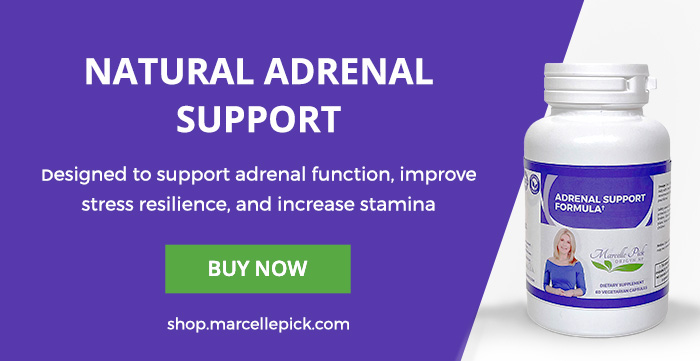Updated 10/24/2021
Angie came to me in early November one year and declared “I’m not going to survive the holiday season this year!” When I asked her to explain, she said it was only the beginning, but she was already exhausted from trying to be in a million places at once.
She had to prep for the holidays – and with a huge extended family and two young children of her own, there was a lot to do: shop for gifts, decorate for their annual gathering, baking and prepping all the holiday favorites, and taking her kids to see Santa at the mall.
On top of that, she had a major work project due by January 1 and she had to prepare for winter weather. Then came the last straw — she caught a cold, and it just wouldn’t go away.
That’s what brought her to me. She said she simply couldn’t be sick for the next two months! I told her it was no coincidence that she’d gotten sick now, where there was so much to worry about already. That’s because stress and adrenal function have a huge impact on the immune system.
Do you feel like Angie every time the holiday season rolls around? Are you trying to cram even more activity into your already jam-packed schedule? If so, there’s something you need to know!
Adrenal function and illness
I’ve been following the research for decades, and a number of studies have shown that all of the different kinds of life stressors, including high job stress, divorce or relationship struggles, and bereavement lead to decreased immune function and increased vulnerability to viruses and infections. And when stress is chronic and adrenal function suffers, the problem can get even worse.
Every year, when winter comes creeping in, I see a flurry of resources dedicated to how we can support immune function and ward off viruses. There is so much good advice out there that conventional medicine rarely offers, including boosting levels of key nutrients that we may be lacking, especially in the winter months (like vitamin D).
There’s one thing I don’t see mentioned nearly enough. What is it? Supporting adrenal health! Adrenal fatigue (dysfunction) is, in my experience, one of the most common reasons the immune system is struggling.
An immune system problem related to adrenal fatigue can mean more frequent viruses and infections, and a harder time recovering from them. It can also lead to an increased likelihood of developing certain kinds of chronic disease (we’ll talk about that more a little later).
Finally, if adrenal fatigue is interfering with immune system function, it’s a pretty solid bet that other areas of your health including hormonal balance, mood regulation, and metabolism are out of whack too.
We know that the adrenal glands, located atop the kidneys, are responsible for producing hormones related to our stress response. One of the key players is cortisol, often referred to as the “stress hormone”.
Levels of cortisol that are too high or too low are a key indication that adrenal dysfunction is present. And when cortisol levels are out of balance, and adrenal function is compromised, your immune system suffers too. Let’s look at how and why that happens.
Adrenal Fatigue, Cortisol, and Immune System Function
Since we often call cortisol the “stress hormone”, it can be easy to be fooled into thinking it doesn’t impact other areas of our health. But nothing could be further from the truth! Cortisol is actually crucial when it comes to regulating the immune system!
Let’s start by taking a basic look at how the immune system works. When the body detects an intruder– called a pathogen– the immune system gets to work on attacking it and protecting us from it. This involves creating inflammation, in part to signal that defense and repair is necessary.
It is this inflammatory response that leads to those common cold symptoms like a stuffed up or runny nose, sore throat, or a fever.
Because of its many links to chronic disease, we often think of inflammation as a dirty word. In truth, inflammation is an absolutely essential component of a healthy immune response. But it can’t be left to run wild — something must regulate it to keep it from becoming excessive, overreactive, or chronic.
This is one of cortisol’s jobs. When you have healthy adrenal function, balanced cortisol levels, and a healthy immune system, cortisol helps to reduce inflammation and keep levels in check during an immune response, without eliminating it entirely.
Cortisol levels that are too high or too low lead to either an underactive immune system and insufficient inflammation to protect us against viruses, infections, and other pathogens, or an overactive immune system and too much inflammation (which can lead to issues like autoimmunity and allergies). Of course, neither situation is good!
How high cortisol can lead to more viruses and infections
Depending on how advanced your adrenal fatigue or dysfunction is, your levels of cortisol might be too high, or they might be too low. These two states of imbalance are both problematic for the immune system, but in different ways.
Usually, in the earlier stages of adrenal fatigue, our stress response system is very busy (just like us)! Our adrenals are working overtime to combat a heavy load of stressors, from the emotional to the physical to the environmental, and this includes producing a ton of cortisol.
I mentioned earlier that one of cortisol’s roles is reducing and managing inflammation during an immune response. The thing is, when cortisol levels are really high the way they are in the early stages of adrenal fatigue, inflammation is reduced too much, and the immune system is suppressed to the point of not really functioning properly.
Basically, when we encounter stress, cortisol and the rest of our hormonal team are thinking this: something really challenging is going on, and we need all hands on deck! Let’s just move some of our resources away from the immune system (and the digestive system, and the reproductive system) for a bit while we take care of this problem.
Seems reasonable on its face, but when high stress becomes chronic, and stressors are ever present rather than being dealt with and then disappearing, our stress hormones don’t have the chance to return everything back to normal. With all of the modern stressors we face, it’s really common for cortisol levels to just stay high, which means that immune system function stays low.
This makes us more susceptible to colds, the flu, and bacterial infections. It also helps to explain why we often get sick at that “worst” time– stress itself is making us more vulnerable to illness.
High cortisol levels can also make it more difficult for us to recover from viruses and infections. Just like Angie, my patients often tell me that their colds seem to linger on forever.
How low cortisol can lead to autoimmunity and chronic illness
As adrenal dysfunction progresses, certain things start to change. While you may once have been producing way too much cortisol in an attempt to battle high levels of stress, your adrenal glands and the rest of your stress response system might now be exhausted and unable to even produce the amount that you need.
We know that high cortisol levels suppress the immune system. So wouldn’t low cortisol levels actually lead to a boost in immune function?
The answer is… kind of! But here’s the rub: when cortisol levels get too low, we are actually removing the watchman that keeps an eye on inflammation during an immune response. Basically, the immune system and inflammation are left to run amok.
When nothing is monitoring it, and the immune system is left to its own devices, a number of new problems can arise. This is when “inflammation” becomes that “dirty word” again. Inflammation can become problematic and chronic, which can lead to a number of illnesses including fibromyalgia and Chronic Fatigue Syndrome, mood disorders and depression, and obesity, to name a few.
It can also lead to autoimmune disease (autoimmunity occurs when the immune system attacks the body’s own healthy cells and tissues) and the development of allergies, also characterized by an overactive immune system.
How to naturally support adrenal & immune system function
Adrenal fatigue is one of the most common problems I see in my practice, and this often comes with symptoms and concerns related to faulty immune system function.
Some patients feel like they’re just getting sick all the time, many have illnesses like Angie’s which lingers on and on with no relief, or the infection keeps coming back.
I also see a lot of autoimmunity, food allergies or sensitivities that were not present earlier in life, and digestive concerns including leaky gut and dysbiosis (an imbalance in gut bacteria). All of these issues are related to issues with the immune system caused in large part by adrenal dysfunction.
What bothers me to no end is hearing about how many of these patients have been treated for these issues with no resolution. So many doctors are prescribing medication after medication– or doling out antibiotics like they’re candy– which just creates more stress and inflammation, and doesn’t get to the root of the problem.
Of course, antibiotics and other medications are sometimes necessary, but my point is that we shouldn’t be overlooking the root cause.
When we see signs of immune system dysfunction of any kind, we should start thinking about and supporting adrenal function! I also firmly believe that adrenal support should be included when we talk about immune-boosting protocols during the colder months.
Natural support for the immune system and adrenal function may include the use of adaptogens, a category of powerful herbs that have been found to help regulate the stress response and manage cortisol levels. Adaptogens that may help with adrenal fatigue include rhodiola, maca, eleuthero, and ginseng.
Certain vitamins and nutrients can also be very helpful here. Vitamin C is essential for both adrenal and immune system function, and levels have been shown to decrease during stress. B vitamins and magnesium are also crucial.
As with all supplements, it’s smart to consult with a practitioner and determine what specific protocol is best for you.
Choosing whole, fresh, anti-inflammatory foods is extremely important, as well as finding ways to bring more relaxation, calm, and mindfulness into your life.
Although there are many herbs, nutrients, and other supplements that can be very helpful for adrenal function and immune system function, you can’t supplement or even eat your way out of adrenal fatigue. It requires really digging into your stressors, and finding ways to reduce levels of stress in order to heal.
Stress is everywhere, but we don’t have to just accept the consequences and live with it. It shouldn’t be “normal” to be so stressed out that your body, hormonal system, and immune system can’t function properly. Consider this a prescription for self-care!
I highly recommend working with a functional medicine practitioner who will help you to get to the root of your adrenal dysfunction, hormonal imbalances, and immune system dysfunction, and support true healing rather than offering you a band-aid “solution”.
Angie tried my advice – including taking some time to think about what was truly important during the holiday season. She realized she needed to scale back on the decorating and baking, decline an invite or two, and focus on her family. She made a conscious effort to eat better (avoiding many of those holiday “treats” made a real difference for her). She added a high-quality multivitamin and some targeted supplements.
When she came to see me in the new year, she looked like a completely different person. Not only had she survived the season, she’d thrived!
With this deeper understanding of how the immune system, the adrenals, and hormones like cortisol are all intertwined, you can too. And, like Angie, you’ll know what areas of stress to attend to so you can move forward, heal your adrenals, and truly enjoy your life!









